
Environment & energy in President Biden’s first 100 days in office
Brought to you 43 days early.
Journalists are reliably fond of two things: 1) Arbitrary ways to grade politicians, like the "100 days in office" meme; and 2) scooping the competition.
Well, here's my scoop on President Biden's first 100 days when it comes to the environment.
Executive orders
On the campaign trail, Biden promised a Gatling gun's worth of Executive Orders. His Inauguration Day executive order on climate change is a veritable Russian nesting doll of presidential decrees, calling for everything from respect for science to cancellation of the Keystone XL pipeline.
In a separate letter, he re-enlisted the U.S. in the Paris Climate Accord. A week later, another multi-faceted executive order established a goal of 30 percent protection of U.S. land and waters and blocked new oil and gas leases on federal land.
House
Got omens, anyone? If climate change should be a powerful election issue anywhere, it would be Miami and the Florida Keys. Florida's 26th and 27th districts cover that turf. Scientists predict that rising seas will turn virtually all of both districts into surf by century's end. In 2018, the Republican co-chair of the bipartisan Congressional Climate Caucus, Carlos Curbelo, lost his seat in the 26th to Democrat Debbie Mucarsel-Powell.
In the 27th, another Climate Caucus Republican, Ileana Ros-Lehtinen, retired, clearing the way for Democrat Donna Shalala.
Both Democrats lasted only one term. While their GOP replacements have also embraced climate action, there's little overall movement in the GOP nationally. House Minority Leader Kevin McCarthy (R-CA) has gently nudged the party toward taking climate change seriously, he's also helped lead the loud Republican attack against Progressive Dems' Green New Deal.Senate
Majority Leader Chuck Schumer (D-NY), otherwise a strong supporter of federal action on climate change, has blocked an effort by the Federal Emergency Management Agency (FEMA) to adjust federal flood insurance rates.
FEMA wants rates that would better reflect the greatly increased risks to beachfront homes, including some of the priciest properties in the country on Long Island's coastline.
Cabinet

DOI Secretary Deb Haaland swearing-in with Vice President Kamala Harris. (Credit: U.S. Department of the Interior)
Deb Haaland was sworn in this week as the first Native American cabinet member in any Administration. Her domain at the Interior Department will include the Fish & Wildlife Service, the Bureau of Land Management, the Park Service, and the Bureau of Indian Affairs. Her Environmental Protection Agency counterpart, Michael Regan, inherits understaffing, staff morale problems, and never-ending problems with Superfund and other cleanup programs.
At the Department of Energy, new Energy Secretary Jennifer Granholm has designs on a massive clean energy turnaround with a department whose budget is still two-thirds devoted to maintaining nuclear weapons or cleaning up the mess left behind by them.
States
State governorships, cabinets and legislatures have taken an abrupt turn into complete control of statehouses. According to the website Ballotpedia, 38 states are dominated by "trifectas" where both legislative houses and the governor's office are controlled by the same party" -- 23 by Republicans and 15 by Democrats.
Of the 23 Republican states, 21 have joined in efforts to sue the White House over its cancellation of the Keystone XL pipeline.
Wise Use redux
In the 1990's, the "Wise Use Movement" became a particularly fierce player in western U.S. politics, motivated by what they saw as federal overreach on control of western grazing, water, and mining rights. During the Obama Administration, similar protests led by the family of Cliven Bundy, drew a more strident, sometimes violent, pose.
Following the January 6 insurrection at the U.S. Capitol, fears over a backlash to Biden's potential actions are growing.
Climate, environment and energy issues rarely dominate the headlines. In the age of COVID, there's little chance that they will.
But there's a lot happening in those "secondary" stories that can impact our lives for years to come.
Peter Dykstra is our weekend editor and columnist. Contact Peter at pdykstra@ehn.org or @pdykstra.
His views do not necessarily represent those of Environmental Health News, The Daily Climate, or publisher, Environmental Health Sciences.
Banner photo credit: The White House













